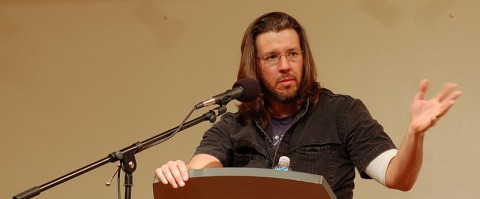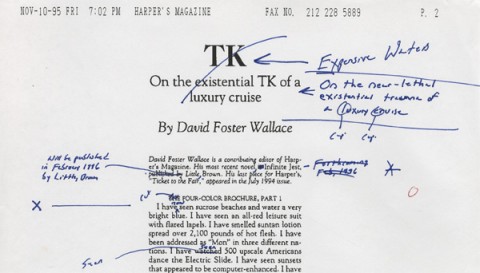For fans of David Foster Wallace, who died far too young, Open Culture is your one-stop resource for all kinds of writing, interviews, and other media. They've posted two collections of links and an interview this week that I wanted to share with all of you.
Yesterday would have been his 50th birthday.
David Foster Wallace: The Big, Uncut Interview (2003)
February 20th, 2012
In 2003, an interviewer from German public television station ZDF sat down with novelist David Foster Wallace in a hotel room. The ensuing conversation, whose raw, unedited 84 minutes (find links to the complete interview below) made it to the internet after Wallace’s suicide, remains the most direct, expansive, and disarmingly rough-hewn media treatment of his themes, his personality, and the fascinating (if at times chilling) feedback loop between them. You can also experience this conversation in short, thematically organized clips; above, we have “David Foster Wallace on Political Thinking in America.” Wallace expresses his concerns about the strong influence of television ads on elections, which means, he says,”we get candidates who are beholden to large donors and become, in some ways, corrupt, which disgusts the voters, makes them even less interested in politics, less willing to read and do the work of citizenship.” This he sees coupled with an individualistic marketing culture which stokes “that feeling of having to obey every impulse and gratify every desire” — “a strange kind of slavery.”
But as his pained, self-questioning expression reveals — especially when it retreats into strangely endearing post-answer cringes — Wallace did not believe he possessed the cure for, or even a precisely accurate diagnosis of, a sick society. Offering social criticism at a vast remove from the avuncular condemnation of a Noam Chomsky or the raised middle finger of a Bill Hicks, Wallace discusses his fears through a novelist’s consciousness that longs to, as he explains the desire elsewhere in the interview, “jump over the wall of self and inhabit someone else.” When the interviewer tells him about her peers’ frustration at feeling educated but “not being able to do anything with it,” Wallace puts himself in the mind of students who go from studying “the liberal arts: philosophy, classical stuff, languages, all very much about the nobility of the human spirit and broadening the mind” to “a specialized school to learn how to sue people or to figure out how to write copy that will make people buy a certain kind of SUV” to “jobs that are financially rewarding, but don’t have anything to do with what they got taught — and persuasively taught — was important and worthwhile.”
Underneath Wallace’s responses rushes a current of the questions his writing leads readers to think — and think hard — about: How far has entertainment evolved toward pure anesthetic? Can we still separate our needs from our wants, if we try? Has post-Gen X irony made us not just collectively ineffectual but that much easier to sell things to? Can we ever again use terms like “citizenship” without instinctively sneering at ourselves? To the David Foster Wallace novice, these clips make for a helpful thematic primer, but the full recording (see below) will thereafter become required viewing. The interview brims with the kind of asides that make it feel like a page from the notebook of one of Wallace’s own favorite literary craftsmen, Jorge Luis Borges. Wallace wonders aloud how much of what he says will get edited out, if he can discuss his all-consuming suspicion that “there’s something really good on another channel and I’m missing it” while he’s actually on television, and how to talk to the media about how difficult it is to talk to the media while pretending you don’t know you’re talking to the media. As he admits after unpacking one particularly difficult issue, “It’s all… complicated.”
Links to Complete Interview:
Part 1, Part 2, Part 3, Part 4, Part 5, Part 6, Part 7, Part 8 and Part 9.
Colin Marshall hosts and produces Notebook on Cities and Culture.
The David Foster Wallace Audio Archive: A Little Gift For the Novelist’s 50th Birthday
February 21st, 2012
When we featured David Foster Wallace’s big, uncut interview yesterday, one important detail escaped us — the fact that the novelist would have turned 50 years old today. Kind of a stunning thought, especially if you vividly remember the wunderkind taking the literary world by storm with Infinite Jest in 1996. Seems like only yesterday.
To celebrate his 50th, we’re highlighting for you The David Foster Wallace Audio Project — a site that brings together most of the meaningful DFW audio available on the web. Built in 2009 by Jordyn Bonds and Ryan Walsh, a short while after the novelist committed suicide, the audio site is divided into four sections:
As you sift through the collection, you will find 70+ clips, including a segment of DFW’s 2005 commencement speech at Kenyon College, his first and second appearances on the Charlie Rose Show, his reading from “Consider the Lobster” at UCLA, and the author contemplating the play of Roger Federer. Dive into the full collection here.
* * * * * * *
29 Free Essays & Stories by David Foster Wallace on the Web
February 22nd, 2012
We started the week expecting to publish one David Foster Wallace post. Then, because of the 50th birthday celebration, it turned into two. And now three. We spent some time tracking down free DFW stories & essays available on the web, and they’re all now listed in our collection of Free eBooks. But we didn’t want them to escape your attention. So here they are — 23 pieces published by David Foster Wallace between 1989 and 2011, mostly in major U.S. publications like The New Yorker, Harper’s, The Atlantic, and The Paris Review. Enjoy, and don’t miss our other collections of free writings by Philip K. Dick and Neil Gaiman.
- “9/11: The View From the Midwest” (Rolling Stone, October 25, 2001)
- “All That” (New Yorker, December 14, 2009)
- “An Interval” – (New Yorker, January 30, 1995)
- “Asset” - (New Yorker, January 30, 1995)
- “Backbone,” An Excerpt from The Pale King (New Yorker, March 7, 2011)
- “Brief Interviews with Hideous Men” (The Paris Review, Fall 1997)
- “Consider the Lobster” (Gourmet, August 2004)
- “David Lynch Keeps His Head” (Premiere, 1996)
- “Everything is Green” (Harpers, September 1989)
- “E Unibus Pluram: Television and U.S. Fiction” (The Review of Contemporary Fiction, June 22, 1993)
- “Federer as Religious Experience” – New York Times, August 20, 2006)
- “Good People” (New Yorker, February 5, 2007)
- “Host” (The Atlantic, April 2005)
- “Incarnations of Burned Children” (Esquire, April 21, 2009)
- “Laughing with Kafka” (Harper’s, January 1998)
- “Little Expressionless Animals” (The Paris Review, Spring 1988)
- On Life and Work (Kenyon College Commencement address, 2005)
- “Rabbit Resurrected” (Harper’s, August 1992)
- “Several Birds” (New Yorker, June 17, 1994)
- “Shipping Out: On the (nearly lethal) comforts of a luxury cruise” (Harper’s, January 1996)
- “Tennis, Trigonometry, Tornadoes: A Midwestern Boyhood” – (Harper’s, December 1991)
- “Tense Present: Democracy, English, and the wars over usage“ (Harper’s, April 2001)
- “The Awakening of My Interest in Annular Systems” (Harper’s, September 1993)
- “The Compliance Branch“ (Harper’s, February 2008)
- “The Depressed Person” (Harper’s, January 1998)
- “The String Theory” (Esquire, July 1996)
- “The Weasel, Twelve Monkeys And The Shrub” – (Rolling Stone, April 2000)
- “Ticket to the Fair” - (Harper’s, July 1994)
- “Wiggle Room” - (New Yorker, March 9, 2009)



No comments:
Post a Comment